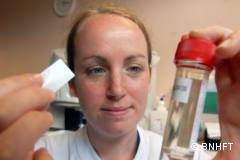Pelican supports research that informs and improves bowel cancer treatment today. The charity’s research studies to date have underlined that a multi-disciplinary approach to treatment is vital to achieving the best possible outcome for bowel cancer patients.
The Total Mesorectal Excision (TME) precise surgical technique that was pioneered by Professor Bill Heald, founder of the Pelican Cancer Foundation. TME saves more lives than any other treatment for bowel cancer. It halves the chance of the cancer returning and reduces negative side effects such as damage to urinary and sexual function. TME has already made a life-saving, life-enhancing difference to thousands of patients all over the world.
Following this direction Pelican has continued to aid ground-breaking research into bowel cancer. Their first major research programme, MERCURY investigated the role of MRI in detecting and clearly staging disease, and in planning precision surgery. The study found that MRI could identify the features of a lower bowel (rectal) tumour pre-operatively, allowing for individualised optimal treatment, to be planned by the multi-disciplinary team, including pre-operative therapies, such as radio- or chemotherapy which can shrink the tumours.
MRI allows early tumours to be identified, for which surgery alone is best and pre-operative therapy is not necessary. By informing clinical decision-making, MRI is now providing an opportunity to downstage even poor prognosis rectal tumours and improve patient outcomes.
Building on the wealth of data from the MERCURY project, one of Pelican’s principle research projects at the moment, MERCURY II (Low Rectal Cancer Study), is investigating the ability of MRI-planned surgery and selective pre-operative therapy to reduce the rates of local tumour recurrence and improve overall survival for patients. This is the work of Nick Battersby, based at the Pelican Centre under the project leadership of Mr Brendan Moran and Professor Gina Brown.
Another significant area of research that Pelican is involved in is the Deferral of Surgery Study at the Royal Marsden Hospital. This research looks at the tumour response in low rectal cancers to pre-operative chemoradiation and whether, if it is good, surgery can be safely delayed or avoided to improve patient quality of life. It aims to establish the time needed for maximum down-staging of the tumour and therefore the optimum timing for surgery. In a small number of cases surgery can be avoided altogether but the challenge is discovering which tumours are most likely to respond.
